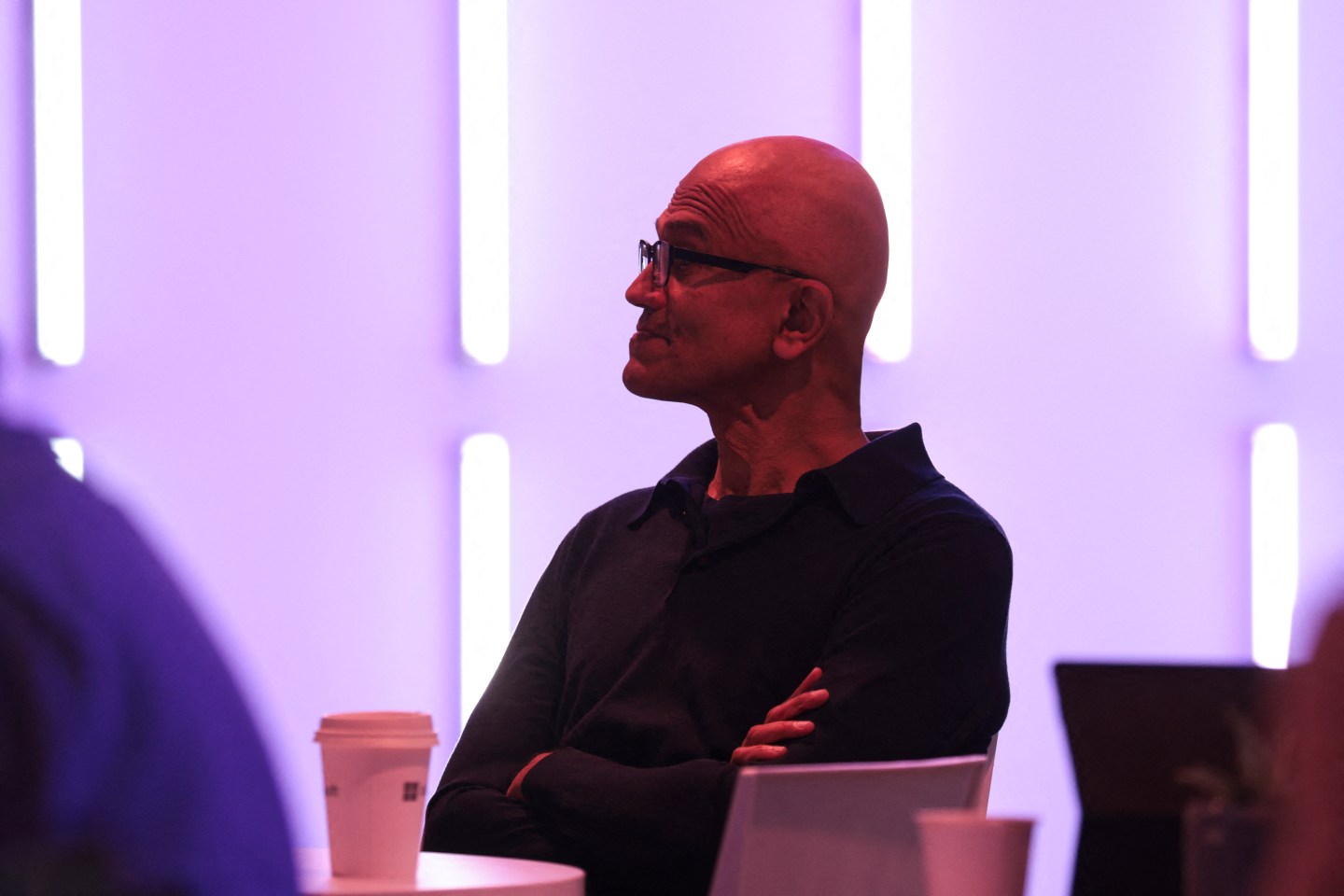Good morning. Today is National Croissant Day, I’m told, so if you’re on the fence about what to have with your morning coffee, today’s as good a time as any. (Just make sure they’re the real laminated deal and not those puffy American imposters.)
What’s that got to do with tech, you ask? Robotic automation can pick, package, and load a croissant—but not make one. There’s something beautiful in that, non? —Andrew Nusca
P.S. The registration form for Fortune Brainstorm AI London (May 6-7) is now officially open. We’ll announce the program soon, but please don’t wait. Join us.
Want to send thoughts or suggestions to Data Sheet? Drop a line here.
Microsoft will be ‘AI capacity-constrained’ this quarter

Microsoft shares fell some 5% in after-hours trading Wednesday after the company shared strong quarterly results but a weaker-than-expected outlook.
Microsoft reported Q2 earnings per share of $3.23 (versus $3.11 expected) on revenues of $69.63 billion (vs. $68.78 billion expected). CEO Satya Nadella said the company’s AI business has topped an annual revenue run rate of $13 billion.
Revenue from the company’s Azure cloud platform and related services was up 31%, a slight deceleration from the previous quarter. Sales in the segment that includes its Office and LinkedIn businesses were up 14% to $29.44 billion, topping expectations. Revenue in the segment that includes Windows, Bing, Surface and Xbox, totaled $14.65 billion, flat year over year but beating estimates.
But CFO Amy Hood predicted Q3 sales between $67.7 billion and $68.7 billion—a bit lower than the $69.78 billion Wall Street consensus. Hood said the company expects to be “AI capacity-constrained” in Q3, but will catch up to near-term demand by the end of the fiscal year.
“AI scaling laws continue to compound across both pre-training and inference time compute. We ourselves have been seeing significant efficiency gains in both training and inference for years now,” Nadella said during a call with investors.
“As AI becomes more efficient and accessible, we will see exponentially more demand,” he added. “Therefore…we are focused on continuously scaling our fleet globally and maintaining the right balance across training and inference as well as geo-distribution.” —AN
Meta will spend 50% more on AI infrastructure this year
Meta reported Q4 earnings yesterday that beat expectations, but the social media company predicts a slowdown for the current quarter—and rapidly accelerating expenses for the year.
The Facebook, Instagram, and WhatsApp parent reported Q4 earnings per share of $8.02 on revenues of $48.4 billion, topping the Wall Street consensus on both figures. The company also reported full-year revenue of $164.5 billion, up 22% from last year, and net income of $62.4 billion, up 59% from last year.
But Q1 of this fiscal year won’t be so strong, Meta says. The company predicts revenue for the current quarter between $39.5 billion and $41.8 billion, an increase of between 8% and 15% from last year. It did not offer a full-year revenue forecast.
CFO Susan Li says Meta plans to spend between $60 billion and $65 billion on AI infrastructure projects in its current fiscal year, substantially higher than the $39.2 billion in capital expenditures it made in fiscal 2024.
“We expect the single largest driver of expense growth in 2025 to be infrastructure costs, driven by higher operating expenses and depreciation,” she said during a call with investors. “We expect employee compensation to be the second-largest factor as we add technical talent.”
CEO Mark Zuckerberg added that this will be the year that an AI agent achieves the coding and problem-solving capabilities of a mid-level engineer. “This is going to be a profound milestone and potentially one of the most important innovations in history,” he said, “as well as over time, potentially a very large market.” —AN
DeepSeek is inaccurate about news most of the time
With great popularity comes great scrutiny, and it seems DeepSeek isn’t doing so well under the gaze of AI safety researchers.
Two research reports this week suggest not only that DeepSeek’s answers seem more interested in the Chinese Communist Party line than the truth—its keenness for censorship has already been well established—but also that it lacks key safety guardrails.
The information-reliability organization NewsGuard said DeepSeek’s R1 model provides inaccurate answers or non-answers 83% of the time when asked about news-related topics, placing it in 10th place out of 11 popular chatbots that also include OpenAI’s ChatGPT and Anthropic’s Claude.
Meanwhile, cybercrime threat intelligence outfit Kela said its researchers had managed to “jailbreak the model across a wide range of scenarios, enabling it to generate malicious outputs, such as ransomware development, fabrication of sensitive content, and detailed instructions for creating toxins and explosive devices.”
All this takes place in the context of an intensifying Western backlash against the Chinese app—OpenAI is complaining about DeepSeek allegedly training its model on the output of OpenAI’s models, as though OpenAI didn’t also train on other people’s data.
But the research suggests there are real reasons to be concerned about DeepSeek’s popularity, even leaving protectionism aside. The U.S. Navy is steering clear of DeepSeek, and the National Security Council is looking into it. —David Meyer
More data
—GM says its EV business has become “variable profit positive.”
—IBM shares up 8% on strong outlook, AI sales. Q4 revenue up 1% YoY to $17.6 billion, beating estimates.
—SoftBank may invest up to $25bn in OpenAI. A deal would make it OpenAI's biggest backer.
—Comcast deploys “ultra low lag” tech in select U.S. cities to improve video, gaming.
—Tesla promises a “return to growth in 2025.” Actual sales and profits for Q4 missed estimates.
—Waymo to test AVs in 10 new U.S. cities this year. Plus, robotaxi operations planned for Austin, Atlanta, Miami.
—966 U.S. startups shut down in 2024, up from 769 in 2023. One third were enterprise SaaS.













